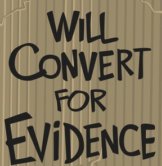
|
The Fable of the Christ: Michael B. Paulkovich
I have always been a staunch Bible skeptic but not a Christ-mythicist. I maintained that Jesus probably existed but had fantastic stories foisted upon the memory of his earthly yet iconoclastic life. After exhaustive research for my first book, I began to perceive both the light and darkness from history. I discovered that many prominent Christian fathers believed with all pious sincerity that their savior never came to Earth or that if he did, he was a Star-Trekian character who beamed down pre-haloed and full-grown, sans transvaginal egress. And I discovered other startling bombshells. An exercise that struck me as meritorious, even today singular, involved reviving research into Jesus-era writers who should have recorded Christ tales but did not. John Remsburg enumerated forty-one "silent" historians in The Christ (1909). To this end, I spent many hours bivouacked in university libraries, the Library of Congress, and on the Internet. I terminated that foray upon tripling Remsburg's count: in my book, I offer 126 writers who should have but did not write about Jesus (see the box on p. 57). Perhaps the most bewildering "silent one" is the super-Savior himself. Jesus is a phantom of a wisp of a personage who never wrote anything. So, add one more: 127. Perhaps none of these writers is more fascinating than Apollonius Tyanus, saintly first-century adventurer and noble paladin. Apollonius was a magic-man of divine birth who cured the sick and blind, cleansed entire cities of plague, foretold the future, and fed the masses. He was worshiped as a god and as a son of a god. Despite such nonsense claims, Apollonius was a real man recorded by reliable sources. Because Jesus ostensibly performed miracles of global expanse (such as in Matthew 27), his words going "unto the ends of the whole world" (Rom. 10), one would expect virtually every literate person to have recorded those events. A Jesus contemporary such as Apollonius would have done so, as well as those who wrote of Apollonius. Such is not the case. In Philostratus's third-century chronicle Vita Apollonii, there is no hint of Jesus. Nor does Jesus appear in the works of other Apollonius epistolarians and scriveners: Emperor Titus, Cassius Dio, Maximus, Moeragenes, Lucian, Soterichus Oasites, Euphrates, Marcus Aurelius, or Damis of Hierapolis. It seems that none of these first- to third-century writers ever heard of Jesus, his miracles and alleged worldwide fame be damned.
Another bewildering author is Philo of Alexandria. He spent his first-century life in the Levant and even traversed Jesus-land. Philo chronicled contemporaries of Jesus - Bassus, Pilate, Tiberius, Sejanus, Caligula - yet knew nothing of the storied prophet and rabble-rouser enveloped in glory and astral marvels. Historian Flavius Josephus published his Jewish Wars circa 95 CE. He had lived in Japhia, one mile from Nazareth - yet Josephus seems unaware of both Nazareth and Jesus. (I devoted a chapter to the interpolations in Josephus's works that make him appear to write of Jesus when he did not.) The Bible venerates the artist formerly known as Saul of Tarsus, but he was a man essentially oblivious to his savior. Paul was unaware of the virgin mother and ignorant of Jesus's nativity, parentage, life events, ministry, miracles, apostles, betrayal, trial, and harrowing passion. Paul didn't know where or when Jesus lived and considered the crucifixion metaphorical (Gal. 2:19 - 20). Unlike what is claimed in the Gospels, Paul never indicated that Jesus had come to Earth. And the "five hundred witnesses" claim (1 Cor. 15) is a forgery. Qumran, hidey-hole for the Dead Sea Scrolls, lies twelve miles from Bethlehem. The scroll writers, coeval and abutting the holiest of hamlets one jaunty jog eastward, never heard of Jesus. Christianity still had that new-cult smell in the second century, but Christian presbyter Marcion of Pontus in 144 CE denied any virgin birth or childhood for Christ. Jesus's infant circumcision (Luke 2:21) was thus a lie, as well as the crucifixion! Marcion claimed that Luke was corrupted; Christ self-spawned in omnipresence, esprit sans corps. I read the works of second-century Christian father Athenagoras and never encountered the word Jesus - Athenagoras was unacquainted with the name of his savior! This floored me. Had I missed something? No; Athenagoras was another pious early Christian who was unaware of Jesus. The original Mark ended at 16:8, with later forgers adding the fanciful resurrection tale. John 21 also describes post-death Jesus tales, another forgery. Millions should have heard of the crucifixion with its astral enchantments: zombie armies and meteorological marvels (Matt. 27) recorded not by any historian but only in the dubitable scriptures scribbled decades later by superstitious folks. The Jesus saga is further deflated by Nazareth, a town without piety and in fact having no settlement until after the war of 70 CE - suspiciously, just around the time the Gospels were concocted. Conclusion When I consider those 126 writers, all of whom should have heard of Jesus but did not - and Paul and Marcion and Athenagoras and Matthew with a tetralogy of opposing Christs, the silence from Qumran and Nazareth and Bethlehem, conflicting Bible stories, and so many other mysteries and omissions - I must conclude that Christ is a mythical character. Jesus of Nazareth was nothing more than an urban (or desert) legend, likely an agglomeration of several evangelic and deluded rabbis who might have existed. I also include in my book similarities of Jesus to earlier God-sons such as Sandan and Mithra and Horus and Attis, too striking to disregard. The Oxford Classical Dictionary and Catholic Encyclopedia, as well as many others, corroborate. Thus, today I side with Remsburg - and with Frank Zindler, John M. Allegro, Godfrey Higgins, Robert M. Price, Salomon Reinach, Samuel Lublinski, Charles-François Dupuis, Allard Pierson, Rudolf Steck, Arthur Drews, Prosper Alfaric, Georges Ory, Tom Harpur, Michael Martin, John Mackinnon Robertson, Alvar Ellegård, David Fitzgerald, Richard Carrier, René Salm, Timothy Freke, Peter Gandy, Barbara Walker, Michael Martin, D.M. Murdock, Thomas Brodie, Earl Doherty, Thomas L. Thompson, Bruno Bauer, and others - heretics and iconoclasts and freethinking dunces all, it would seem. If all the evidence and nonevidence including 126 (127?) silent writers cannot convince, I'll wager that we will uncover much more. Yet this is but a tiny tip of the mythical-Jesus iceberg: nothing adds up for the fable of the Christ. The Silent Historians
|
Send comments to:
 hjw2001@gmail.com
hjw2001@gmail.com
|





